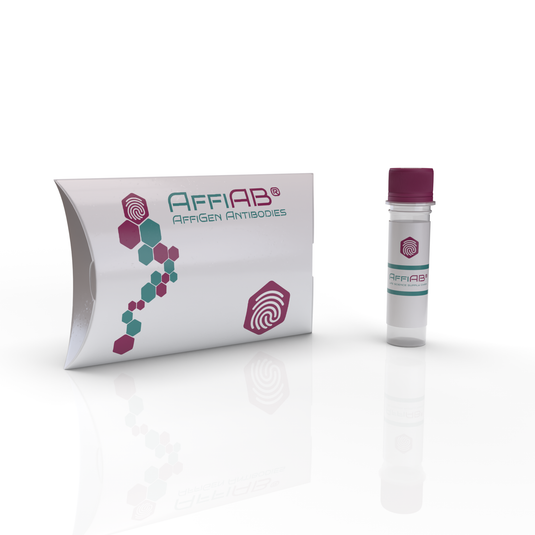AffiAB® Goat Anti-TUBA4A Polyclonal IgG Antibody
Our AffiAB® Goat Anti-TUBA4A Polyclonal IgG Antibody provides a highly specific, affinity-purified antibody suitable for a range of applications. This antibody recognizes tubulin alpha 4a protein and has been validated for use in Western blot, immunohistochemistry, immunocytochemistry, and immunoprecipitation.
Host: Goat
Species: Human
Description:
The AffiAB® Goat Anti-TUBA4A Polyclonal IgG Antibody is an antibody derived from goats that specifically recognizes and binds to the TUBA4A protein. TUBA4A, also known as Tubulin Alpha 4A, is a member of the alpha tubulin family and plays a crucial role in cellular processes such as cell division, intracellular transport, and cell shape maintenance.
This polyclonal antibody is generated by immunizing goats with purified TUBA4A protein, resulting in the production of antibodies that specifically target and bind to TUBA4A. The antibody can be used to detect and study TUBA4A expression and localization in different biological samples, such as cells, tissues, and organisms.
The AffiAB® Goat Anti-TUBA4A Polyclonal IgG Antibody is commonly used in research applications, including Western blotting, immunohistochemistry, and immunofluorescence. It allows researchers to investigate the role of TUBA4A in various cellular processes and physiological conditions.
When using the AffiAB® Goat Anti-TUBA4A Polyclonal IgG Antibody, it is important to follow the recommended protocols and dilutions provided by the manufacturer. This ensures optimal performance and specific detection of TUBA4A in your experiments. Additionally, including appropriate controls and performing proper optimization steps is crucial for obtaining reliable and accurate results.
For detailed instructions on the specific applications and usage of the AffiAB® Goat Anti-TUBA4A Polyclonal IgG Antibody, please refer to the product datasheet or consult the manufacturer's instructions.
Gene Identifier/Accession Number: ENSG00000127824
Form: N/A
Concentration: 2 mg/mL
Type: Primary
Clonality: Polyclonal
Isotype: IgG
Conjugation: Unconjugated
Application: Western Blot, Immunofluorescence
Storage: For continuous use, store at 2-8 °C for one-two days. For extended storage, store in -20 °C freezer. Working dilution samples should be discarded if not used within 12 hours.
Special instructions: The antibody solution should be gently mixed before use.
Goat Anti-TUBA4A Polyclonal IgG Antibody
In the intricate field of neurobiology, understanding the molecular components of neural cells is pivotal for unraveling the complexities of the brain and nervous system. The Anti-TUBA4A Polyclonal IgG Antibody has emerged as a significant tool in this endeavor. This antibody targets TUBA4A (Tubulin Alpha 4a), a protein that plays a crucial role in the structure and function of microtubules in neurons. This article provides an overview of the antibody, its production, applications, and significance in neurological research.
Background: The Role of TUBA4A
TUBA4A is a member of the tubulin family, specifically the alpha-tubulin subfamily, which are key components of microtubules. Microtubules are essential for maintaining cell structure, intracellular transport, and are particularly crucial in neurons for axonal transport. Mutations in the TUBA4A gene have been linked to various neurodegenerative diseases, including Amyotrophic Lateral Sclerosis (ALS), making it a protein of considerable interest in neuropathological research.
Production of Anti-TUBA4A Polyclonal IgG Antibody
The Anti-TUBA4A Polyclonal IgG Antibody is typically produced by immunizing animals, such as rabbits or goats, with a TUBA4A antigen. The immune response in the host animal leads to the production of a diverse set of IgG antibodies that target various epitopes on the TUBA4A protein. These polyclonal antibodies are then collected and purified from the serum of the immunized animal, ensuring specificity and high affinity for the TUBA4A protein.
Characteristics of the Antibody
Specificity:
The Anti-TUBA4A Polyclonal IgG Antibody has a high specificity for the TUBA4A protein, which is crucial for accurate detection and study of this protein in various biological samples.
Affinity:
Due to its polyclonal nature, the antibody binds to multiple epitopes on TUBA4A, enhancing its binding strength and ensuring reliable detection.
Versatility:
This antibody can be used in a variety of laboratory techniques, including Western blotting, immunohistochemistry, and immunofluorescence microscopy.
Applications in Research
Neurodegenerative Disease Studies: The antibody is instrumental in researching diseases like ALS, where TUBA4A mutations are implicated. It helps in understanding the pathological mechanisms underlying these conditions.
Cellular and Molecular Neuroscience: It is used to study the role of TUBA4A in neuronal cell structure, particularly in axonal growth and maintenance, and in neuronal transport mechanisms.
Quality Control and Storage
The quality of the antibody is critically assessed for purity, specificity, and concentration. It is generally provided in a stabilizing buffer and should be stored at -20°C to maintain its integrity and performance over time.
Safety and Handling
As with all laboratory reagents, handling the Anti-TUBA4A Polyclonal IgG Antibody requires adherence to safety protocols. Users should wear appropriate protective equipment and handle the antibody in accordance with standard laboratory safety guidelines.
Conclusion
The Anti-TUBA4A Polyclonal IgG Antibody is a powerful tool in neurobiological research, offering insights into the structure and function of neuronal cells and the molecular mechanisms of neurodegenerative diseases. Its specificity and versatility in various experimental contexts underscore its value in advancing our understanding of neuronal biology and in the development of therapeutic strategies for neurological disorders.

